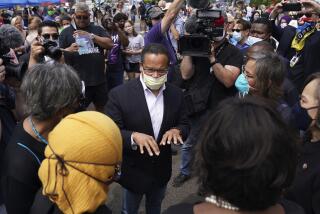White House Unveils Its Overseas Code of Corporate Conduct : International: The voluntary standards are quickly criticized by human rights activists and the business community.
- Share via
The White House on Monday finally unveiled its long-awaited voluntary code of conduct for U.S. corporations operating abroad, and it satisfied neither corporations nor human rights activists.
Designed to address such thorny issues as the use of prison and child labor and freedom of speech in the workplace, the policy that emerged was criticized as “a compromise of a compromise of a compromise” that will have little real-world effect.
President Clinton promised to propose such a code last spring to appease human rights critics angered by his decision to renew China’s most-favored-nation trade status and preserve billions of dollars in trade. It was expanded to include all countries to avoid the appearance of singling China out.
But the Administration has been unable to devise a strategy that satisfies both sides because there remains a fundamental disagreement over what role corporations should play in promoting democracy and human rights around the world.
The “Model Business Principles” unveiled Monday include providing a safe and healthy workplace, not discriminating on the basis of race, gender or religion, respecting collective bargaining, pursuing safe environmental practices, respecting free expression, not condoning political coercion and complying with U.S. laws prohibiting bribery.
The Clinton Administration asked U.S. companies to voluntarily adopt the code of conduct and encourage similar practices by their foreign partners. But the concept has had little support in the business community from the start. And critics said it is too vague and broadly worded to have any meaningful effect in countries where governments are corrupt or wield too heavy a hand.
Carol Richards, a spokeswoman for the activist group Burma Forum, said the voluntary code would be useless in fighting the kind of authoritarian government that rules Myanmar, formerly known as Burma.
Richards and others protested Monday outside the downtown Los Angeles headquarters of Unocal Corp., which is a partner in a multimillion-dollar oil project in Myanmar.
“This kind of code would be useless in Burma,” she said. “People there have no freedom of expression, no right to collective bargaining.”
Mike Jendrzejczyk, Washington director for Human Rights Watch/Asia, said, “We’re quite disappointed. This falls far short of what is needed.”
Individual firms such as Fluor Corp., Atlantic Richfield Co. and Boeing Co., all with extensive overseas operations, said they could not comment on the code until it was officially released.
But the U.S. Chamber of Commerce called parts of it ambiguous and objected to being handed the document as a fait accompli .
“If the Administration had felt strongly about this set of principles, it should’ve gone to U.S. companies who could have expressed their viewpoints and not just come out with a code and asked them to support it,” said Myron Brilliant, director of trade policy for Asian affairs for the chamber.
A White House spokeswoman said the code was developed through an interagency process that involved months of consultations with the human rights and business communities. The document circulated Monday was described as the final version.
Brilliant said most U.S. companies operating abroad already have codes of conduct that include many of the principles established in the document. But he said those companies are uncomfortable adopting a U.S. government policy that places the responsibility for improving human rights abroad on corporations and hurts their ability to compete with European and Asian companies operating without similar restrictions.
Some of the principles--such as the request that companies keep shareholders informed of their efforts to meet the principles--are also “somewhat ambiguous and open to interpretation,” according to Brilliant.
In fact, the shareholder statement was the one piece of the code applauded by Simon Billenness, a senior analyst for Franklin Research & Development Corp. of Boston, which invests in “socially responsible” firms. He predicted companies that adopt this code will be responding to increased requests for information on their operations abroad.
More to Read
Sign up for Essential California
The most important California stories and recommendations in your inbox every morning.
You may occasionally receive promotional content from the Los Angeles Times.













